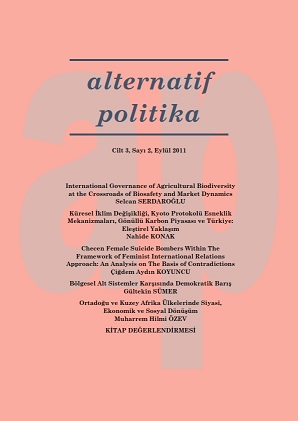Küresel İklim Değişikliġi, Kyoto Protokolü Esneklik Mekanizmalari, Gönüllü Karbon Piyasasi Ve Türkiye: Eleştġrel Yaklaşim
Global Climate Change, Kyoto Protocol’s Flexibility Mechanisms, Voluntary Carbon Market and Turkey: Critical Viewpoint
Author(s): Nahide KonakSubject(s): Supranational / Global Economy, Energy and Environmental Studies, Environmental and Energy policy, International relations/trade
Published by: Rasim Özgür DÖNMEZ
Keywords: Climate Change; Kyoto Protocol; Flexibility Mechanisms; Clean Development Mechanism; Carbon Market;
Summary/Abstract: The main purpose of this paper is to critically analyze the Kyoto Protocol's flexibility mechanisms that have been established to mitigate global warming as well as to critically evaluate the situation of Turkey with regard to the Kyoto Protocol and voluntary carbon market, and to offer some suggestions. In reality, carbon markets in general and Kyoto Protocol‟s flexibility mechanisms specifically have been established for the purpose of further commodification and expansion of capitalist market rather than for decreasing green house gases. Carbon markets cannot help solving the main problem of fossil energy dependency of societies. In reality, carbon markets have resulted in the continuity of existing system and encouragement of the use of fossil fuels. As a consequence, carbon markets have transformed global warming problem either to poor countries or to future generations. Many researchers have documented that the Kyoto Protocol‟s Clean Development Mechanism projects have violated human rights, produced negative social, economic, political and environmental impacts, and thus, have emphasized that carbon offsetting projects have been failed fulfilling one of its main goals, that is, to contribute to the sustainable development in developing countries. In Turkey, some clean energy development projects have entered into the voluntary carbon trade market, and Turkey tries to increase its market share. In addition, if the Kyoto Protocol‟s policies would remain in effect after 2012, Turkey aims to achieve a status for hosting Kyoto Protocol‟s Clean Development Mechanism projects. As happened in other countries, the main purpose of these projects is not to contribute to the solution of global warming by adopting strong sustainable development criteria; rather, to obtain a larger share from carbon trade profits. If this is the case, the environmental and social impacts assessments for the projects in the voluntary carbon market must be urgently conducted in Turkey. Studies must be conducted to minimize the environmental and social impacts of these projects, and the Turkish people must be informed about the issue. In Turkey, real comprehensive sustainable development criteria must be developed.
Journal: Alternatif Politika
- Issue Year: 3/2011
- Issue No: 2
- Page Range: 154-178
- Page Count: 25
- Language: Turkish

